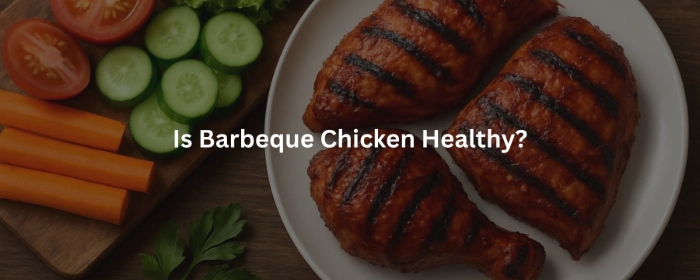Is Barbeque Chicken Healthy?

-
The Role of Marinades and Sauces
-
Cooking Method Matters
-
Portion Size and Sides
-
Temperature and Food Safety
Disclosure: Some of the links in this article may be affiliate links, which can provide compensation to me at no cost to you if you decide to purchase. This site is not intended to provide financial advice and is for entertainment only.
Barbeque chicken is a favorite at cookouts, family dinners, and summer parties.
But if you’re watching your diet or trying to eat healthier, you may wonder: is barbeque chicken healthy?
The answer depends on how it’s prepared, cooked, and served.
Let’s break it down in a simple way so you can enjoy your meal without guilt.
The Basics: Why Chicken Can Be a Healthy Choice
Chicken is naturally a lean source of protein.
Compared to red meat, it has less saturated fat, which makes it better for heart health.
Skinless chicken breast, for example, is low in calories but high in protein, making it a smart choice for building muscle and staying full longer.
When barbequed, chicken keeps most of these benefits.
It can be filling, packed with nutrients, and much lighter than fried foods.
The key is how you season and cook it.
The Role of Marinades and Sauces
A big factor in whether barbeque chicken is healthy is the sauce.
Many bottled BBQ sauces are loaded with sugar, sodium, and additives.
Just a few spoonfuls can add hundreds of calories and a lot of hidden sugar.
If you want a healthier plate, try:
Using dry rubs with spices like paprika, garlic powder, or cumin.
Choosing low-sugar or homemade sauces.
Adding fresh herbs and lemon for flavor instead of extra salt.
This way, you keep the smoky, delicious taste without loading up on extra calories.
If you enjoy exploring flavor variations, you might like this guide on how to make BBQ fried chicken — it shows a fun twist on traditional chicken while keeping the BBQ spirit alive.
Cooking Method Matters
Grilling is usually healthier than frying, but it still has some things to watch out for.
Cooking chicken over high flames for too long can create compounds (like HCAs and PAHs) that aren’t good for health.
To lower this risk:
Cook at medium heat instead of charring the meat.
Flip chicken often so it cooks evenly.
Trim off any burnt edges before eating.
Keeping your grill clean is also important, as leftover grease and char can affect both taste and health.
Tools like the Easy Function Wood Grill Scraper help you remove buildup safely, without metal bristles that can break off.
Skin On or Skin Off?
Chicken skin adds flavor, but it’s higher in fat.
Leaving the skin on during cooking keeps the meat juicy, but you can remove it before eating if you’re trying to cut calories.
That way, you still get the smoky BBQ taste with less fat.
Portion Size and Sides
Barbeque chicken itself can be healthy, but the whole meal matters.
A large leg quarter with heavy sides like mac and cheese, creamy coleslaw, or buttered cornbread adds up quickly.
For a lighter plate, pair your chicken with:
Grilled vegetables
A fresh salad
Baked sweet potato
Corn on the cob (without too much butter)
This balances the meal and keeps it filling without being heavy.
Temperature and Food Safety
Undercooked chicken is unsafe to eat, no matter how “healthy” the recipe is.
Always make sure your chicken reaches an internal temperature of 165°F (74°C).
A simple tool like the Easy Function Meat Temperature Guide can help you check safe cooking temps quickly while grilling.
So, Is Barbeque Chicken Healthy?
Yes — barbeque chicken can be a healthy choice when you cook it right.
Use lean cuts, go easy on sugary sauces, keep your grill clean, and serve it with lighter sides.
Done this way, it’s a tasty, protein-packed meal that works well for most diets.
If you’re ready to make your next BBQ both safe and delicious, click the image below to explore our Easy Function grill tools and guides.
They’ll help you cook smarter, cleaner, and healthier — every time you fire up the grill.
P.S. - Before you read Is Barbeque Chicken Healthy, find out Can Diabetics Eat Barbecue Chicken? A Complete Guide. It explains sugar, sauces, and smart swaps so you can enjoy BBQ chicken with fewer health risks.
-
The Role of Marinades and Sauces
-
Cooking Method Matters
-
Portion Size and Sides
-
Temperature and Food Safety
Disclosure: Some of the links in this article may be affiliate links, which can provide compensation to me at no cost to you if you decide to purchase. This site is not intended to provide financial advice and is for entertainment only.
